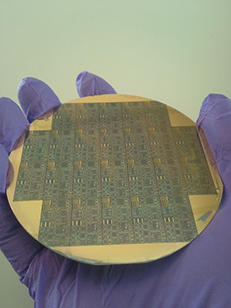FAYETTEVILLE, Ark. – Engineering researchers at the University of Arkansas have designed integrated circuits that can survive at temperatures greater than 350 degrees Celsius – or roughly 660 degrees Fahrenheit. Their work, funded by the National Science Foundation, will improve the functioning of processors, drivers, controllers and other analog and digital circuits used in power electronics, automobiles and aerospace equipment – all of which must perform at high and often extreme temperatures.
“This ruggedness allows these circuits to be placed in locations where standard silicon-based parts can’t survive,” said Alan Mantooth, Distinguished Professor. “The circuit blocks we designed contributed to superior performance of signal processing, controllers and driver circuitry. We are extremely excited about the results so far.”
The research is critical because one-third of all power produced in the United States passes through some kind of power electronic converter or motor drive before it reaches the end user. Circuits developed by the University of Arkansas team will enable tight integration of control in the tough environmental conditions these applications demand. They will also improve electrical efficiency while simultaneously reducing the overall size and complexity of these systems.
The researchers worked with silicon carbide, a semiconducting material that is more rugged than conventional materials used in electronics. Silicon carbide is able to withstand extremely high voltage and is a good thermal conductor, meaning it can operate at high temperatures without requiring extra equipment to remove heat.
 Last fall, the U of A circuit design team celebrated the completion of more than 40 silicon-carbide circuit functions. Last fall, the U of A circuit design team celebrated the completion of more than 40 silicon-carbide circuit functions. |
The research team, led by Mantooth and Jia Di, professor of computer engineering, achieved the higher performance by combining silicon carbide with wide temperature design techniques. In the world of power electronics and integrated circuits, their work represents the first implementation of a number of fundamental analog, digital and mixed-signal blocks, such as a phase-locked loop using a complimentary-style silicon carbide technology. A phase-locked loop, or PLL, is a control system that generates an output signal whose phase is related to the phase of an input signal. Such a function is critical in a number of circuit applications such as signal synchronization, frequency synthesis, and modulation and demodulation schemes.
The research was part of the National Science Foundation’s Building Innovation Capacity program, which is designed to partner university and industry research to build intellectual collaborations so that innovations flow from ideas to solid research results, company prototypes and products. The University of Arkansas and two Fayetteville technology firms, Ozark Integrated Circuits and Arkansas Power Electronics International, form the basis for this innovation ecosystem. Raytheon is also a key partner.
Ozark Integrated Circuits is commercializing the circuit technology. Arkansas Power Electronics International focuses on using the circuits in power applications.
The research funding was awarded to Arkansas Circuit Design Center, which is comprised of two laboratories, one directed by Mantooth and one by Di. The Arkansas Circuit Design Center supports the mission of the University of Arkansas’ National Center for Reliable Electric Power Transmission, which is funded as part of the federal government’s focus on research and development on smart grid and renewable technologies. The center is one of only a few university-based research centers investigating electronic systems to make the nation’s power grid more reliable and efficient. The U.S. Department of Energy has funded the center since 2005 because of the university’s research expertise in advanced power electronics and long-term investigation of silicon carbide. Mantooth is executive director of the center.
Arkansas Power Electronics International specializes in advanced, high-performance electronics for a variety of customers and applications, including the defense, aerospace and hybrid/electric vehicle markets. Ozark Integrated Circuits is a semiconductor company that develops integrated circuits for remote sensing and actuation under extreme environmental conditions.
Mantooth is holder of the Twenty-First Century Chair in Mixed-Signal Integrated Circuit Design and Computer-Aided Design in the College of Engineering.
Contacts
Matt Francis, president and chief executive officer
Ozark Integrated Circuits
479-935-1600,
Alan Mantooth, Distinguished Professor, electrical engineering
College of Engineering
479-575-4838,
Matt McGowan, science and research communications officer
University Relations
479-575-4246,
